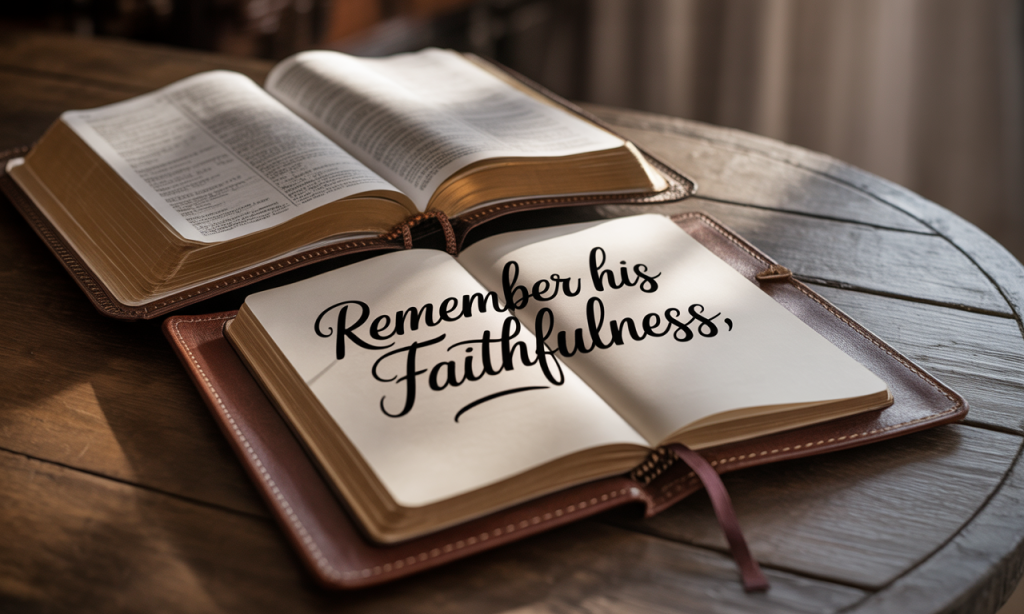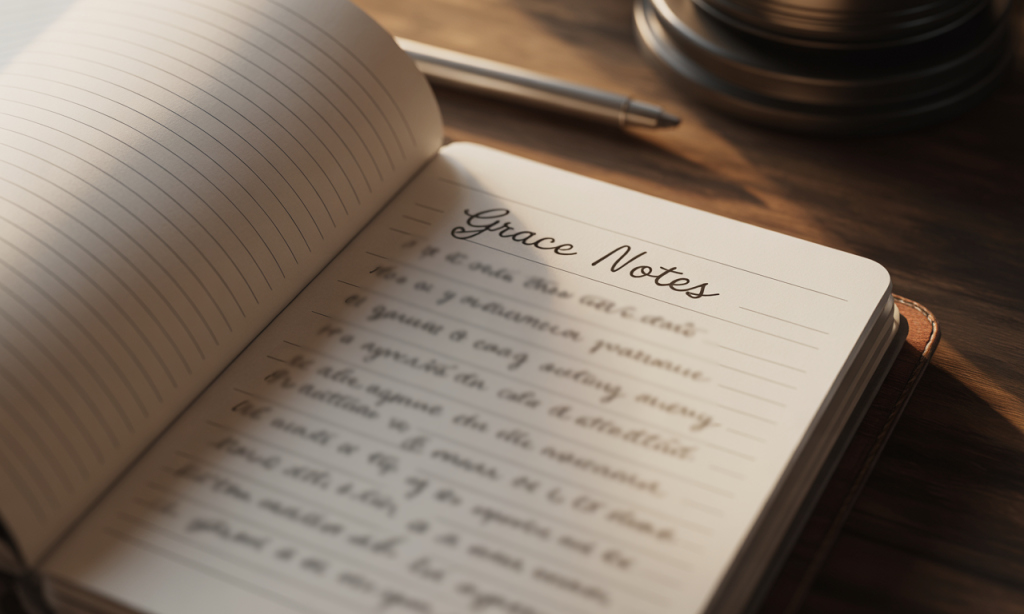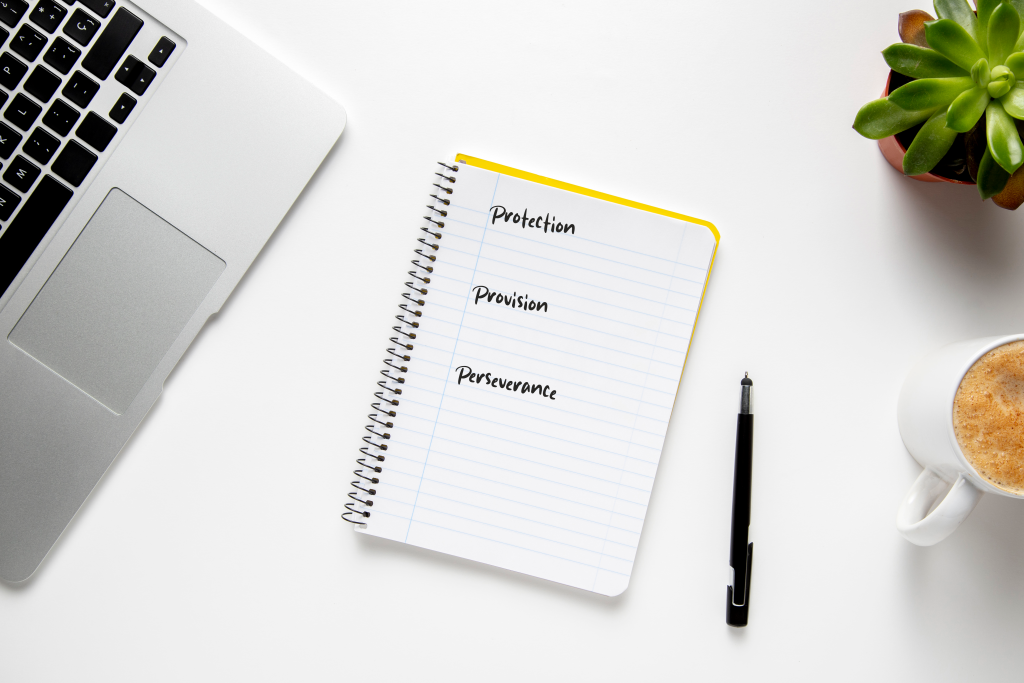The Reflection Habit: How to End Each Week with Perspective

Some weeks drain you so completely that all you can see is what went wrong. But couples who pause to reflect—before rushing to fix—recover faster. The Reflection Habit is a five-minute Friday ritual that turns review into relief. Instead of listing failures, you’ll trace grace: where you showed up for each other, where God met you in the middle, and what tiny wins deserve a quiet nod. It’s not about rewriting history; it’s about learning to end each week with gratitude instead of exhaustion.
Why Every Marriage Needs a Reflection Habit
 In most relationships, reflection happens only after something breaks. We wait until the argument is loud or the distance is wide before we look back and ask what happened. But wise couples learn to reflect before crisis—when there’s still energy to notice what’s working and what’s worth keeping.
In most relationships, reflection happens only after something breaks. We wait until the argument is loud or the distance is wide before we look back and ask what happened. But wise couples learn to reflect before crisis—when there’s still energy to notice what’s working and what’s worth keeping.
The Reflection Habit isn’t a dramatic intervention; it’s a gentle rhythm that turns every week into a checkpoint for grace. It’s a way to reset perspective before exhaustion takes over.
Why it matters:
- Reflection restores reality. When you’re tired, your brain exaggerates failure. Reflection balances the picture.
- Reflection reconnects perspective. Instead of “we blew it,” you start to see “we grew through it.”
- Reflection renews gratitude. You begin to notice small mercies you would have otherwise missed.
This practice ties beautifully to Celebrate the Ordinary: How Noticing Small Joys Changes the Mood of Your Home—where couples learn that ordinary moments are emotional anchors. The Reflection Habit is how you make those anchors visible every week.
The Science and Spirit of Weekly Reflection
 There’s a biological reason reflection changes everything. Neuroscience shows that gratitude and reflection activate the brain’s calming systems, reducing cortisol and increasing empathy. When couples reflect together, their nervous systems synchronize—lowering defensiveness and raising compassion.
There’s a biological reason reflection changes everything. Neuroscience shows that gratitude and reflection activate the brain’s calming systems, reducing cortisol and increasing empathy. When couples reflect together, their nervous systems synchronize—lowering defensiveness and raising compassion.
Spiritually, reflection mirrors what Scripture calls remembering. Over and over, God instructs His people to recall what He’s done:
“Remember the Lord your God, for it is He who gives you the ability to produce wealth.” — Deuteronomy 8:18
“I will remember the deeds of the Lord; yes, I will remember your miracles of long ago.” — Psalm 77:11
In marriage, this same remembering transforms exhaustion into endurance. It moves your focus from the week’s chaos to the consistent thread of grace running through it.
If you’ve read Faithful Remembering: Spiritual Practices to Recall God’s Goodness in Marriage, you’ll recognize the connection. The Reflection Habit is a micro-version of that same spiritual practice, designed for ordinary Fridays—not just crises or milestones.
Step One: Choose Your Anchor Time
 The Reflection Habit works best when it’s predictable. Pick a consistent moment—Friday evening, Saturday morning, or Sunday afternoon—when you naturally slow down. The key is consistency, not perfection.
The Reflection Habit works best when it’s predictable. Pick a consistent moment—Friday evening, Saturday morning, or Sunday afternoon—when you naturally slow down. The key is consistency, not perfection.
Here are a few examples:
- Five minutes after dinner on Fridays before screens or chores pull you apart.
- During Saturday morning coffee, while the house is still quiet.
- Sunday night wind-down to set tone for the week ahead.
Make it small enough that it feels doable even on your worst week. Reflection isn’t another task; it’s an exhale.
For couples already using Design Your Marriage Rhythms: The Rituals & Resets Handbook, this becomes one of your weekly anchors—like a built-in emotional tune-up.
Step Two: Start with Grace, Not Guilt
 When reflection begins with “what went wrong,” the brain braces for blame. Instead, start with grace:
When reflection begins with “what went wrong,” the brain braces for blame. Instead, start with grace:
- What moments this week reminded us of who we want to be?
- Where did we show up for each other, even in small ways?
- What challenge did we handle better than last time?
This approach rewires your focus from guilt to growth.
Here’s a quick script to guide the tone:
“Let’s each share one thing we’re thankful for, one thing we learned, and one thing we want to carry forward.”
By keeping it simple and positive, you make reflection something you’ll look forward to—not avoid.
Step Three: Trace the Week’s Grace
 After you’ve opened with gratitude, take a deeper look at the week. Trace where grace appeared—sometimes hidden, sometimes loud.
After you’ve opened with gratitude, take a deeper look at the week. Trace where grace appeared—sometimes hidden, sometimes loud.
You can ask:
- What did we overcome together that we might have overlooked?
- How did God provide strength, timing, or patience?
- What joy or humor cut through a heavy moment?
Write these moments in a shared notebook, or save them in your Memory Bank for Couples. Over time, you’ll build a record of weeks that looked ordinary but held extraordinary faithfulness.
This running list becomes a visual reminder that progress doesn’t always shout—it often whispers.
Step Four: Add a Mini “Grace Inventory”
 Borrowing from Past Grace, Present Strength: How to Borrow Faith from What You’ve Survived, create a short “Grace Inventory” each week:
Borrowing from Past Grace, Present Strength: How to Borrow Faith from What You’ve Survived, create a short “Grace Inventory” each week:
- Protection – What potential conflict or stress didn’t escalate?
- Provision – What worked out just in time?
- Perseverance – When did we stay calm or kind under pressure?
Recording these three categories weekly trains your heart to see continuity, not chaos. Over months, you’ll notice patterns—God’s timing, your teamwork, your resilience.
This is the heartbeat of the Reflection Habit: perspective through pattern.
Step Five: Identify the Learning, Not the Blame
 Reflection isn’t avoidance—it’s integration. When you face friction, you don’t have to ignore it; you can interpret it.
Reflection isn’t avoidance—it’s integration. When you face friction, you don’t have to ignore it; you can interpret it.
Ask:
- What is this week teaching us about what matters most?
- What might we do differently next time—with love, not blame?
- How can we honor effort, even if results weren’t perfect?
This kind of reflection builds what psychologists call adaptive meaning—the ability to turn stress into strength by naming its purpose. Spiritually, it’s what James 1 calls “letting perseverance finish its work.”
If you need help differentiating growth from danger, read Friction Isn’t Abuse: Learning the Difference Between Conflict and Harm. That post helps you discern when reflection means adjusting behavior versus setting boundaries.
Step Six: Close with Prayer or a Gentle Blessing
 End your reflection with a small act of worship or warmth. It could be a prayer, a verse, or a sentence like,
End your reflection with a small act of worship or warmth. It could be a prayer, a verse, or a sentence like,
“Thank You, God, for what You carried us through this week. Help us rest in Your grace for what’s next.”
If prayer feels too formal, try a simple moment of silence or a shared deep breath. The goal is calm completion—a sense that the week is released, not replayed.
Couples who pray together during their Reflection Habit report a shift: arguments feel smaller, gratitude feels stronger, and weekends feel lighter.
This moment can link naturally to The Hope Loop: How Remembering Yesterday Fuels Tomorrow, where couples learn to trace recurring grace and let it fuel future confidence.
Step Seven: Make It Visual
 Humans remember what they see. Consider adding a visual element to your Reflection Habit:
Humans remember what they see. Consider adding a visual element to your Reflection Habit:
- A shared “gratitude board” where you pin blessings.
- A jar filled with weekly notes of appreciation.
- A photo collage updated monthly with favorite memories.
These visuals transform invisible grace into something tangible. On hard days, they remind you that hope has a history.
You can combine this idea with Build Your Highlight Reel: A 30-Photo Project to Carry You Through Storms to create a visual “reflection archive.”
Step Eight: Keep the Reflection Habit Light and Sustainable
 The power of this practice isn’t in length but in consistency. A five-minute reflection every week builds more emotional stability than an hour-long talk every few months.
The power of this practice isn’t in length but in consistency. A five-minute reflection every week builds more emotional stability than an hour-long talk every few months.
Tips for sustainability:
- Keep your format the same each week so it becomes a rhythm.
- Don’t skip reflection after hard weeks—those are the ones that matter most.
- Use humor and humility; reflection isn’t therapy, it’s perspective.
Think of it as emotional housekeeping: clearing clutter before it piles up.
The Reflection Habit integrates naturally into Design Your Marriage Rhythms: The Rituals & Resets Handbook. It’s a micro-reset that keeps the emotional system of your relationship running smoothly.
Step Nine: Let Reflection Lead to Restoration
 After a few weeks of practicing the Reflection Habit, you’ll notice a shift. Instead of collapsing at the end of the week, you’ll feel closure. Instead of resentment, relief.
After a few weeks of practicing the Reflection Habit, you’ll notice a shift. Instead of collapsing at the end of the week, you’ll feel closure. Instead of resentment, relief.
That’s the real outcome of reflection: restoration.
You’ll start to see that even messy weeks held quiet faithfulness. That small, ordinary efforts—like showing up tired but still kind—were holy acts of love.
And over time, you’ll realize you’re not just reviewing your week. You’re rewriting your marriage culture—from reactive to reflective, from blame-driven to grace-fueled.
That’s how reflection becomes renewal.


